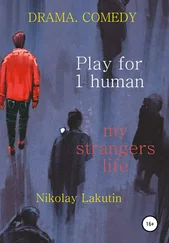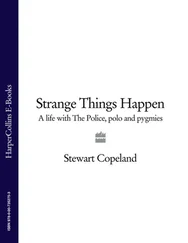Douglas Hofstadter - I Am a Strange Loop
Здесь есть возможность читать онлайн «Douglas Hofstadter - I Am a Strange Loop» весь текст электронной книги совершенно бесплатно (целиком полную версию без сокращений). В некоторых случаях можно слушать аудио, скачать через торрент в формате fb2 и присутствует краткое содержание. Жанр: Прочая документальная литература, на английском языке. Описание произведения, (предисловие) а так же отзывы посетителей доступны на портале библиотеки ЛибКат.
- Название:I Am a Strange Loop
- Автор:
- Жанр:
- Год:неизвестен
- ISBN:нет данных
- Рейтинг книги:4 / 5. Голосов: 1
-
Избранное:Добавить в избранное
- Отзывы:
-
Ваша оценка:
- 80
- 1
- 2
- 3
- 4
- 5
I Am a Strange Loop: краткое содержание, описание и аннотация
Предлагаем к чтению аннотацию, описание, краткое содержание или предисловие (зависит от того, что написал сам автор книги «I Am a Strange Loop»). Если вы не нашли необходимую информацию о книге — напишите в комментариях, мы постараемся отыскать её.
I Am a Strange Loop — читать онлайн бесплатно полную книгу (весь текст) целиком
Ниже представлен текст книги, разбитый по страницам. Система сохранения места последней прочитанной страницы, позволяет с удобством читать онлайн бесплатно книгу «I Am a Strange Loop», без необходимости каждый раз заново искать на чём Вы остановились. Поставьте закладку, и сможете в любой момент перейти на страницу, на которой закончили чтение.
Интервал:
Закладка:
Ultimately, the “I” is a hallucination, and yet, paradoxically, it is the most precious thing we own. As Dan Dennett points out in Consciousness Explained, an “I” is a little like a bill of paper money — it feels as if it is worth a great deal, but ultimately, it is just a social convention, a kind of illusion that we all tacitly agree on without ever having been asked, and which, despite being illusory, supports our entire economy. And yet the bill is just a piece of paper with no intrinsic worth at all.
Trains Who Roll
In Chapters 15 through 18, I argued that each of us is spread out and that, despite our usual intuitions, each of us is housed at least partially in different brains that may be scattered far and wide across this planet. This viewpoint amounts to the idea that one can be in two places at once, despite our initial knee-jerk rejection of such a crazy-sounding thought. If being in two or more places at once seems to make no sense, think about reversing the roles of space and time. That is, consider that you have no trouble imagining that you will exist tomorrow and also the next day. Which one of those future people will really be you? How can two different you’s exist, both claiming your name? “Ah,” you reply, “but I will shortly be getting there, like a train pulling through different stations.” But that just begs the question. Why is it the same train, if in the meantime it has dropped some passengers off and picked others up, perhaps changed a car or two, maybe even its locomotive? It is simply called “Train 641”, and that’s why it is “the same train”. It’s a linguistic convention, and a very good one, too. It is a very natural convention in the classical world in which we exist.
If Train 641, heading east from Milano, always were to split up in Verona into two pieces, one that headed north to Bolzano and one that continued eastwards to Venice, then we would probably not call either half “Train 641” any longer, but would give them separate numbers. But we could also call them “Train 641a” and “Train 641b”, or even just leave them both as “Train 641”. It might happen, after all, that upon reaching Bolzano, the northern half always veers suddenly eastwards, and likewise that upon reaching Venice, the eastern half always veers suddenly northwards, and the two halves always rejoin and fuse together in Belluno, on their way — or rather, on its way — to Udine!
You may object that trains have no inner perspective on the matter — that “641” is just a third-person label rather than a first-person point of view. All I can say is, this is a very tempting viewpoint, but it is to be resisted. Trains who roll and trains that roll are the same thing, at least if they have sufficiently rich representational systems that allow them to wrap around and self-represent. Most trains today don’t (in fact none of them do), so we don’t usually give them the benefit of the “who” pronoun. But maybe someday they will, and then we will. However, the transition from one pronoun to the other won’t be sharp and sudden; it will be gradual, like the fading of the belief in Cartesian Egos as people grow in sophistication.
The Glow of the Soular Corona
It may strike you that this whole chapter has been predicated upon such weird science-fiction scenarios that it has no bearing at all upon how we think about the real world of real human beings, and their real lives and deaths. But I believe that that is mistaken.
I have a close friend whose aging father Jim has Alzheimer’s Disease. For some years my friend has been sadly watching his father lose contact, bit by bit, with one aspect after another of the reality that only a few years ago constituted the absolute bedrock, the completely reliable terra firma, of his inner life. He no longer knows his address, he has lost his former understanding of such mundane things as credit cards, and he isn’t quite sure who his children are, though they look vaguely familiar. And it is all getting dimmer, never brighter.
Perhaps Jim will forget his own name, where he grew up, what he likes to eat, and much more. He is heading into the same terrible, thick, allenveloping fog that former President Reagan lived in during the closing few low-huneker years of his life. And yet, something of Jim is surviving strongly — surviving in other brains, thanks to human love. His easy-going sense of humor, his boundless joy at driving the wide open spaces of the prairies, his ideals, his generosity, his simplicity, his hopes and dreams — and (for what it’s worth) his understanding of credit cards. All of these things survive at different levels in many people who, thanks to having interacted with him intimately over many years or decades, constitute his “soular corona” — his wife, his three children, and his many, many friends.
Even before Jim’s body physically dies, his soul will have become so foggy and dim that it might as well not exist at all — the soular eclipse will be in full force — and yet despite the eclipse, his soul will still exist, in partial, low-resolution copies, scattered about the globe. Jim’s first-person perspective will flicker in and out of existence in other brains, from time to time. He will exist, albeit in an extremely diluted fashion, now here, now there. Where will Jim be? Not very much anywhere, admittedly, but to some extent he will be in many places at once, and to different degrees. Though terribly reduced, he will be wherever his soular corona is.
It is very sad, but it is also beautiful. In any case, it is our only consolation.


CHAPTER 22
A Tango with Zombies and Dualism

Pedantic Semantics?
TO ARGUE over whether the appropriate relative pronoun to apply to some hypothetical thinking machine one day in the future will be “who” or merely “which” would doubtless strike certain people as the quintessence of pedantic semantic quibbling, yet there are other people for whom the question would raise issues of life-or-death importance. Indeed, this is a quintessentially semantic issue, in that it involves deciding what verbal label to apply to something never seen before, but since category assignments go right to the core of thinking, they are determinant of our attitude toward each thing in the world, including such matters as life and death. For that reason, I feel that this pronoun issue, even if it is “merely semantics”, is of great importance to our sense of who or what we are.
The well-known Australian philosopher of mind David Chalmers, which not only is a cherished friend but also is my former doctoral student, has devoted many years to arguing for the provocative idea that there could be both “machines that think” and also “machines who think”. For me, the notion of both types of machine coexisting makes no sense, because, as I declared in Chapter 19, the word “thinking” stands for the dancing of symbols in a cranium or careenium (or some such arena), and this is also what is denoted by the word “consciousness”. Since being conscious merits the use of the pronoun “who” (and also, of course, the pronouns “I”, “me”, and so on), so does thinking — and that settles the question for me. In other words, “machine that thinks” is an incoherent phrase because of its relative pronoun, and if some day there really are machines that think, then by definition they will be machines who think.
Читать дальшеИнтервал:
Закладка:
Похожие книги на «I Am a Strange Loop»
Представляем Вашему вниманию похожие книги на «I Am a Strange Loop» списком для выбора. Мы отобрали схожую по названию и смыслу литературу в надежде предоставить читателям больше вариантов отыскать новые, интересные, ещё непрочитанные произведения.
Обсуждение, отзывы о книге «I Am a Strange Loop» и просто собственные мнения читателей. Оставьте ваши комментарии, напишите, что Вы думаете о произведении, его смысле или главных героях. Укажите что конкретно понравилось, а что нет, и почему Вы так считаете.












